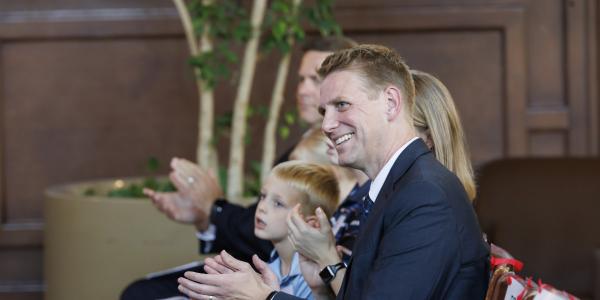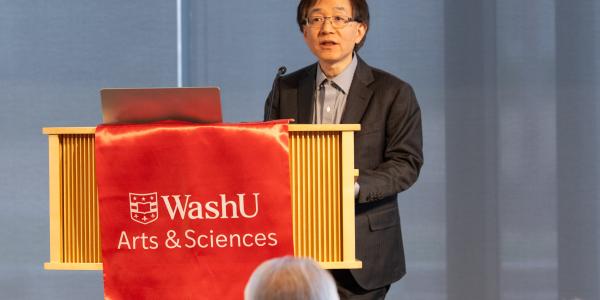On September 17, Abram Van Engen was installed as the Stanley Elkin Professor in the Humanities. The program included a welcome from Feng Sheng Hu, the Richard G. Engelsmann Dean of Arts & Sciences and Lucille P. Markey Distinguished Professor; an introduction by Vincent Sherry, the Howard Nemerov Professor in the Humanities; and the installation and medallion presentation by Dean Hu.

In his installation address, Van Engen described how he’s learned to move between different audiences: the scholarly, the general, and the “intimate public.” The latter is a subset of the general public that shares one’s background and deeply held beliefs, Van Engen said, adding that his intimate public is based on poetry and religious faith. “We all have our own. Mine is not yours. Yours is not mine. And that is a very good thing. All of them matter.” He described WashU as a place where these publics converge, overlap, and influence one another in “a tapestry of breathtaking complexity.”
Van Engen takes particular pride in being honored with a professorship named for the renowned author Stanley Elkin. “I hope to someday get a sentence absolutely perfect just for him,” he said.
About Abram Van Engen
Abram Van Engen is the Stanley Elkin Professor in the Humanities at WashU.
He earned a bachelor’s degree in English and philosophy from Calvin College and a PhD in English from Northwestern University. His research focuses on early American literature, centering primarily on 17th-century Puritans and the way they have been remembered and remade in American culture. His scholarly interests also include poetry, public scholarship, and religion and literature more broadly.
Van Engen is the author of “Sympathetic Puritans” (Oxford University Press, 2015) and “City on a Hill: A History of American Exceptionalism” (Yale University Press, 2020), which won the Pelikan Award and the Peter Gomes Memorial Book Prize. He co-edited “A History of American Puritan Literature” (Cambridge University Press, 2020) and “Feeling Godly” (University of Massachusetts Press, 2021), which contributes to the history of emotions.
His articles have appeared in numerous journals and have been honored with the Walter Muir Whitehill Prize in Early American History. He has also co-edited special issues of American Literature and Christianity and Literature. Several fellowships have supported his work, including a Faculty Fellowship and Public Scholar award from the National Endowment for the Humanities.
Van Engen’s writings for public audiences cover American exceptionalism, poetry, and religious topics in literature. In his recent work, he has turned to the teaching of poetry, co-hosting the popular podcast “Poetry For All” and completing another book, “Word Made Fresh: An Invitation to Poetry for the Church” (Eerdmans, 2024).
Van Engen joined WashU’s Department of English in 2012. He is currently chair of the department.
About the Stanley Elkin Professor in the Humanities
This professorship was one of four established in 1997 by a grant from the Danforth Foundation to recognize distinguished faculty members in the humanities.
The Elkin Professorship honors a writer whose fiction is celebrated for its imaginative poetic style, its exploration of the human condition, and its blending of tragedy and comedy. Stanley Elkin’s writing has been described as “lyrical, bleak, and fantastic.”
Professor Elkin began writing stories in grade school. He earned bachelor’s, master’s, and doctoral degrees in English at the University of Illinois Urbana-Champaign. He joined the WashU faculty in 1960, became a full professor in 1969, and was named the Merle Kling Professor of Modern Letters in 1983.
His works included 17 books as well as numerous articles and stories printed in magazines such as Harper’s and Esquire. Three of his novels were nominated for the National Book Award. “George Mills” (1982) and “Mrs. Ted Bliss,” published after his death in 1995, each won the National Book Critics Circle Award for fiction. He was a member of the American Academy of Arts and Letters.
The Danforth family established the Danforth Foundation in 1927. This private, independent foundation has been a major benefactor of WashU. In recent years, the foundation has concentrated on supporting the St. Louis region with initiatives in the plant and life sciences, neighborhood redevelopment, and downtown revitalization.





